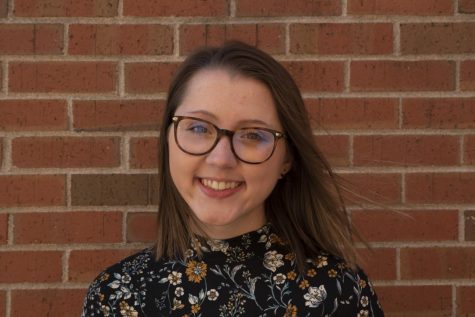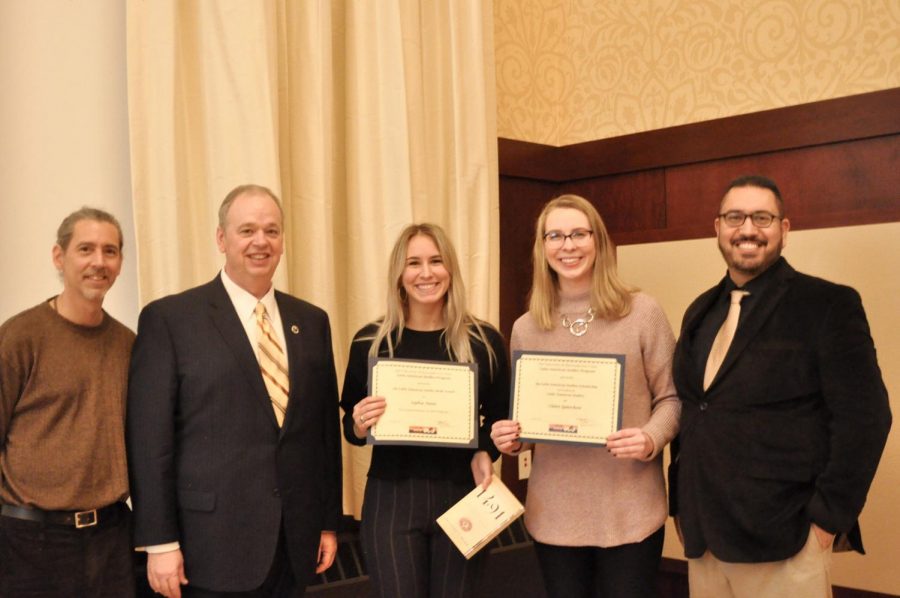Latin American Studies Week comes to a close
The kick off event featured Alejandro Velasco, associate professor at New York University and author, who addressed aspects of the present-day struggles in Venezuela
Photo by Alee Erickson
Speakers, students, and faculty gathered in the Ojibwe ballroom to celebrate Latin American Studies Week.
“I am fortunate to call him a friend and we are fortunate to have him here today.
Please help me welcome Dr. Alejandro Velasco,” Gerardo Licon, associate professor of Latin American Studies at UW-Eau Claire, said at the ceremony.
On Monday, Oct. 21 from 5:30 to 8 p.m. at the Ojibwe Grand Ballroom in Davies Center, the Latin American Studies program hosted a dinner and keynote speaker to close Latin American Studies week, according to the UW-Eau Claire website.
According to the UW-Claire website, coinciding with Latinx Heritage Month each year is the celebration on campus of Latin American Studies Week, a celebration that highlights the culture, history, politics, economies and people of Latin America.
“Latin American Studies Week provides our program with an opportunity to highlight what we are and what we do by attracting all different types of individuals like artists to UWEC to present on areas of research, artistic endeavor, or activism,” Manuel Fernandez said.
Fernandez is the director of the Latin American Studies program and a professor of Spanish here on campus.
The LAS program also provides opportunities for UW-Eau Claire students to present their own research or to talk about study abroad or immersion experiences, Fernandez said.
“LAS Week allows us to make students aware of our program, the different majors, minors, and certificates we have to offer, and how learning about both Latin America and Latinx people in the US can help them in the future, whether it be in terms of jobs and career, being a better and more informed citizen, or just generally being knowledgeable of the world in which they live.”
The event featured keynote speaker, Alejandro Velasco, associate professor at New York University and author of “Barrio Rising: Urban Popular Politics and the Making of Modern Venezuela,” Fernandez said.
In Velasco’s presentation, “Oil, Socialism, and Crisis in Venezuela,” he addressed aspects of the present-day situation in Venezuela while providing a full evaluation of Venezuela’s deeper-seated problems, Fernandez said.
Velasco informed the audience about the history and issues that have led to an inflation rate of up to 1 million percent and the emigration of up to 4 million people in the past few years. He also talked about the political situation in which there are two presidents supported by different governments around the world and people within the nation, Fernandez said.
Velasco is a regular contributor to national and international media outlets including the New York Times, BBC, Al Jazeera, PBS, NPR, CBS, and Nueva Sociedad, Fernandez said.
The Latin American Studies department asked Dr. Velasco to come in last spring for Latin American Studies week as a result of having asked students for topic ideas for their keynote speaker, Fernandez said.
One of the co-sponsors of this event was the women’s, gender and sexuality studies department.
Rose-Marie Avin, a professor of Latin American Studies and the director of women’s, gender and sexuality studies said the WGSS program provided a contribution to help defray the cost of the events during LAS Week.
“The LAS Program and the women’s, gender and sexuality program are interdisciplinary programs that are part of the Office of Interdisciplinary Programs and share a common space on the third floor of Hibbard,” Avin said.
Occasionally, the program works with the LAS department on specific events that deal with gender and sexuality issues in Latin America and in the Latinx community in the United States, she said.
Now, LAS week and Latinx month has come to a close, Fernandez said.
The LAS program held an event Oct. 7 in which peace speaker and activist from Colombia, Leider Valencia, came on campus and talked about the Columbian War on drugs and on Oct. 22, there was a student panel held in which two students talked about their faculty-led international immersion experience in Mendoza, Argentina this past summer.
To become more informed on the topics discussed in Alejandro Velasco’s speech, visit https://www.bbc.com/news/world-latin-america-36319877.
Erickson can be reached at [email protected]

Jenna Erickson is a first-year integrated strategic communications and Spanish student. This is her second semester on The Spectator. Jenna loves coffee, singing and playing the marimba.

